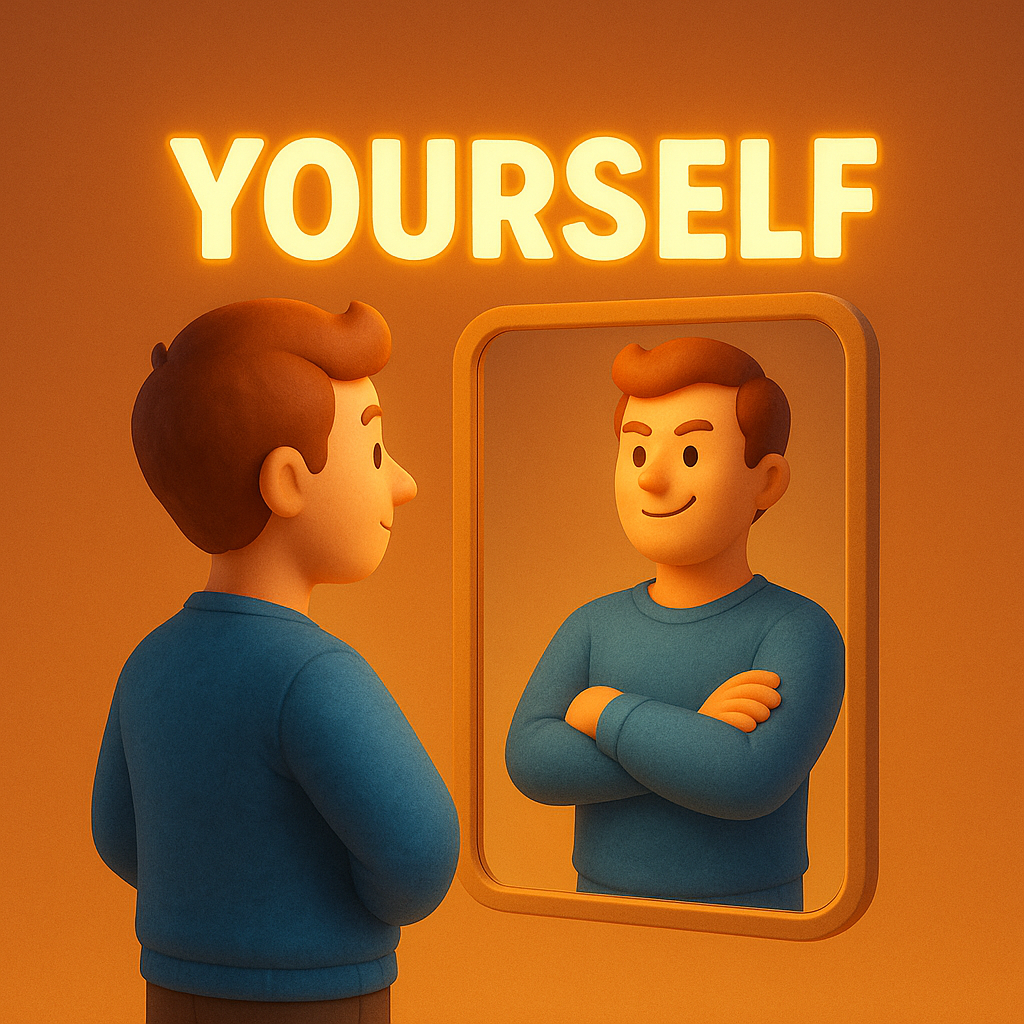Yourself
Definition
Yourself is a pronoun used to refer to the person being addressed, emphasizing their actions or ownership. It can also be used reflexively when the subject and object of a verb are the same.
Parts of Speech
- Pronoun
Pronunciation
American English
- IPA Pronunciation: /jɝːˈsɛlf/
- Respelling: yur-SELF
British English
- IPA Pronunciation: /jɔːˈsɛlf/
- Respelling: yawr-SELF
Etymology
The word "yourself" originated from Old English "ġē self," combining "ġē," meaning "you," with "self," meaning "oneself." It evolved in Middle English into "yourself," influenced by possessive pronouns.
Derivatives
- Yourselves (pronoun, plural form)
- Self-care (noun, concept involving care for oneself)
- Self-aware (adjective)
- None
- None
Synonyms
- You
- Thyself (archaic)
- Your own being
Antonyms
- None
Usage
The word "yourself" is commonly used reflexively or emphatically in sentences. Reflexively: "You should take care of yourself." Emphatically: "Did you do this yourself?"
Related Terms
- You: A pronoun referring to the person being addressed.
- Self: A person's essential being.
- Reflexive pronoun: A pronoun used when the subject and object are the same.
Detailed Definitions
Pronoun
- Used reflexively to indicate the same person as the subject: Refers to the person performing and receiving an action.
- Example: "You need to believe in yourself."
- Used for emphasis: Highlights the person addressed as the one performing an action or owning something.
- Example: "Did you write this report yourself?"
- Used to refer to the general person addressed: Suggests an inclusive or universal meaning.
- Example: "Always be true to yourself."
yourself



🇨🇳 Mandarin Chinese
- 你自己 (yourself - informal, singular)
- IPA: /ni˨˩˦ zi˥˩ t͡ɕi˥/
- English Respell: nǐ zìjǐ
- 您自己 (yourself - formal)
- IPA: /nin˧˥ zi˥˩ t͡ɕi˥/
- English Respell: nín zìjǐ
🇮🇳 Hindi
- तुम खुद (yourself - informal, singular)
- IPA: /t̪um xʊd̪/
- English Respell: tum khud
- आप खुद (yourself - formal or plural)
- IPA: /aːp xʊd̪/
- English Respell: aap khud
🇪🇸 Spanish
- Tú mismo (yourself - informal, masculine, singular)
- IPA: /tu 'mis.mo/
- English Respell: tú mismo
- Usted mismo (yourself - formal, masculine, singular)
- IPA: /us.'ted 'mis.mo/
- English Respell: usted mismo
🇫🇷 French
- Toi-même (yourself - informal, singular)
- IPA: /twa mɛm/
- English Respell: toi-même
- Vous-même (yourself - formal or plural)
- IPA: /vu mɛm/
- English Respell: vous-même
🇦🇪 Arabic (Modern Standard)
- أنت نفسك (yourself - masculine, singular)
- IPA: /anta nafsuka/
- English Respell: anta nafsuka
- أنتِ نفسك (yourself - feminine, singular)
- IPA: /anti nafsuki/
- English Respell: anti nafsuki
🇧🇩 Bengali
- নিজে (yourself)
- IPA: /nid͡ʒe/
- English Respell: nije
🇷🇺 Russian
- Ты сам (yourself - informal, masculine, singular)
- IPA: /tɨ sam/
- English Respell: ty sam
- Вы сами (yourself - formal or plural)
- IPA: /vɨ ˈsa.mɨ/
- English Respell: vy sami
🇵🇹 Portuguese
- Tu mesmo (yourself - informal, singular)
- IPA: /tu 'meʃ.mu/
- English Respell: tu mesmo
- Você mesmo (yourself - formal, singular)
- IPA: /vo'se 'meʃ.mu/
- English Respell: você mesmo
🇮🇩 Indonesian
- Kamu sendiri (yourself - informal, singular)
- IPA: /kamu sən'diri/
- English Respell: kamu sendiri
- Anda sendiri (yourself - formal, singular)
- IPA: /anda sən'diri/
- English Respell: anda sendiri
🇩🇪 German
- Du selbst (yourself - informal, singular)
- IPA: /duː zɛlpst/
- English Respell: du selbst
- Sie selbst (yourself - formal or plural)
- IPA: /ziː zɛlpst/
- English Respell: Sie selbst
🇯🇵 Japanese
- 自分自身 (yourself)
- IPA: /d͡ʑi.bʌɴ d͡ʑi.ɕiɴ/
- English Respell: jibun jishin
🇻🇳 Vietnamese
- Bạn tự (yourself)
- IPA: /ɓaːn˧˧ tʊ̄ˀ˦ˀ˥/
- English Respell: bạn tự
🇰🇷 Korean
- 너 자신 (yourself - informal)
- IPA: /nʌ d͡ʑa.ɕin/
- English Respell: neo jasin
- 당신 자신 (yourself - formal)
- IPA: /daŋ.ɕin d͡ʑa.ɕin/
- English Respell: dangsin jasin
🇹🇷 Turkish
- Kendin (yourself - informal, singular)
- IPA: /kʲendin/
- English Respell: kendin
- Kendiniz (yourself - formal or plural)
- IPA: /kʲen'diː.niz/
- English Respell: kendiniz
🇵🇰 Urdu
- तुम आप (yourself - informal, singular)
- IPA: /t̪um aːp/
- English Respell: tum aap
- आप खुद (yourself - formal or plural)
- IPA: /aːp xʊd̪/
- English Respell: aap khud





